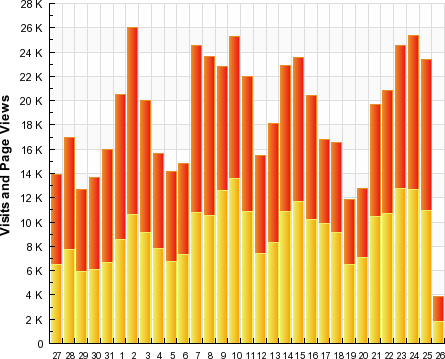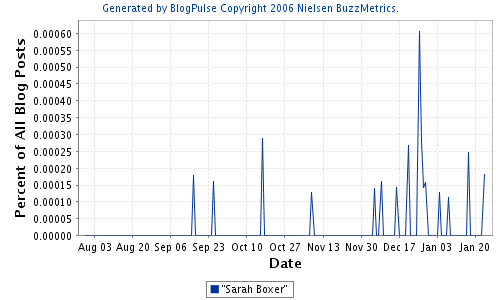January 26, 2008
The media gap
In the latest New York Review of Books, Sarah Boxer ("Blogs", NYRB 55(2) 2/14/2008) reviews ten spectacularly, um, diverse books. There's Cass Sunstein's Republic.com 2.0 and Hugh Hewitt's Blog: Understanding the Information Reformation That's Changing Your World. There's Andrew Keen's The Cult of the Amateur: How Today's Internet Is Killing Our Culture and Daniel Solove's The Future of Reputation: Gossip, Rumor, and Privacy on the Internet. There's ... well, you get the idea.
After some preliminary lexicography -- perhaps there are NYRB readers who don't know what those "blog" things actually are --Boxer disposes of her ten books in one sentence, and gets to the question she really wants to explore:
A growing stack of books has pondered the effects of blogs and bloggers on culture (We've Got Blog and Against the Machine), on democracy (Republic .com 2.0), on politics (Blogwars), on privacy (The Future of Reputation), on media (Blog: Understanding the Information Reformation and We're All Journalists Now), on professionalism (The Cult of the Amateur), on business (Naked Conversations), and on all of the above (Blog!). But what about the effect of blogs on language?
Are they a new literary genre? Do they have their own conceits, forms, and rules? Do they have an essence?
Since none of the ten books being reviewed engages this question, she naturally turns to Language Log:
Bloggers assume that if you're reading them, you're one of their friends, or at least in on the gossip, the joke, or the names they drop. They often begin their posts mid-thought or mid-rant—in medias craze. They don't care if they leave you in the dust. They're not responsible for your education. Bloggers, as Mark Liberman, one of the founders of the blog called Language Log, once noted, are like Plato. :-) The unspoken message is: Hey, I'm here talking with my buddies. Keep up with me or don't. It's up to you. Here is the beginning of Plato's Republic:
I went down yesterday to the Peiraeus with Glaucon, the son of Ariston, to pay my devotions to the Goddess, and also because I wished to see how they would conduct the festival since this was its inauguration.
Wait a second! Who is Ariston? What Goddess? What festival?
And here, for comparison's sake, is a passage from Julia {Here Be Hippogriffs}, a blog about motherhood and infertility:
Having left Steve to his own devices for the past three days I am being heavily pressured to abandon the internet (you! he wants me to abandon you!) and come downstairs to watch SG-1 with him....
So this will have to be quick. Vite! Aprisa aprisa!
I went to Blogher. It was rather fun and rather ridiculous and I am quite glad I went although I do not know if I would ever go again. One thing of note for my infertile blogging friends: DO NOT EVEN THINK ABOUT IT. Do not go. Do not ever ever go to Blogher.
Huh? Who's Steve? What's Blogher? A blog? (No.) A mothers' club? (No.) A blogging conference? (Yes.)
(The LL link is "Weblogs were invented by... Plato!", 11/3/2003.)
After a couple of thousand interesting words about blogging styles, Boxer brackets the discussion with another LL reference:
Writing like this might seem easy, but just try it. Geoffrey Nunberg, a linguist at Stanford who writes for newspapers and radio and sometimes contributes to the blog Language Log, admitted on NPR back in 2004, "I don't quite have the hang of the form." And, he added, many journalists who get called upon by their editors to keep blogs are similarly stumped: "They fashion engaging ledes, they develop their arguments methodically, they give context and background, and tack helpful IDs onto the names they introduce." Guess what? They read like journalists, not bloggers.
(The link is "Blogging in the global lunchroom", commentary broadcast on "Fresh Air," 4/20/2004.)
Vanity aside, Boxer's article is entertaining and intelligent and funny. But there's one aspect of the situation that she misses, something that's always puzzled me: a sort of "media gap". There's not much "virtual click-through", so to speak, from traditional media to the web; and perhaps as a result, there's often a lot less commentary back the other way than you might expect.
Over the years, Language Log has been mentioned or even featured from time to time in fairly high-traffic places. When the source is a web site of some sort, I see a bump in our readership -- but the effect is much smaller, in proportion, when readers need to do anything beyond clicking on a link in order to find us. And exposure on broadcast media, such as Geoff Nunberg's pieces on "Fresh Air", has barely any effect at all. (For an example of the click-through effect, see "The Gray Lady goes up against fark.com", 6/20/2006.)
Although the NYRB has a paid circulation of around 140,000 -- and some online readership as well -- Boxer's mentions of LL haven't had any detectable effect on our visit and hit counts:

Nor has her NYRB article gotten much uptake so far elsewhere in the blogosphere:
Blogpulse has registered two reactions so far, on Jan. 24 and 25. (And one more that doesn't mention the author's name.)The peak in the Blogpulse graph just after Christmas represents two posts (counted by Blogpulse as four) noting that NPR's Morning Edition had a story featuring selections from Boxer's new book Ultimate Blogs: Masterworks from the Wild Web. According to Wikipedia, Arbitron estimates that 13 million people listen to Morning Edition every week. It's "the second most-listened-to national radio show, after The Rush Limbaugh Show". Millions of people, and thousands of bloggers, must have heard that segment -- but only two bloggers linked to it.
I'm not sure what this media gap means, beyond the obvious: the more memory and effort that goes into following up on a reference, the less likely people are to do it. But this is surely part of the reason for the success of new media (including, obviously, open-access scholarly and scientific publishing). Is it also part of the reason for the decline of the old?
[Update -- Ben Zimmer writes:
Just thought I should mention that Sarah Boxer solicited a few of my Language Log posts for her forthcoming blog anthology, Ultimate Blogs, on the topics of truthiness, diapers, Googlefreude, and Chinese menus. I haven't seen it yet (the publication date is Feb. 12), but Publishers Weekly said my contributions make Language Log read like "a wonderfully expansive and more self-aware William Safire column."
]
Posted by Mark Liberman at January 26, 2008 08:48 AM